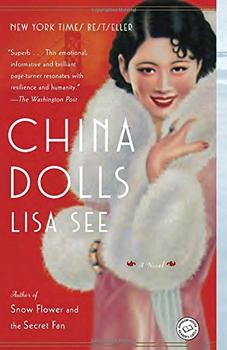Summary | Excerpt | Reading Guide | Reviews | Beyond the Book | Readalikes | Genres & Themes | Author Bio

"My accent?"
"Yeah. You don't have one. You've got to stop talking all perfect. You need to do the ching- chong thing."
Never! My father spoke in heavily accented English, even though he was born here. He always blamed it on the fact that he'd grown up in a lumber camp in the Sierras, where he lived with his father, who conversed only in Chinese. My mother's English was flawless. She was born in China but came to America so early that she'd lost her accent entirely. How she was raised— somehow living far enough from other Chinese that she didn't have an accent— was never discussed. The one time I asked, my father smacked me. In any case, the three of us could understand each other only if we communicated in English. And even if we all had spoken the same dialect, my father would never have allowed us to use it. Speaking English means you are American, and we must be American at all times. Reciting sentences like I hear you cut school again and what's the big deal? showed we were assimilated.
But all that didn't mean Dad wouldn't exaggerate his accent for his customers if he calculated it would make them happy.
"I'm sorry," I said. "But I can't do what you ask."
With nothing left to add, I got up to leave. In just these few minutes I'd learned two things about myself: I would never lower myself by faking an accent like my dad did (or Charlie Chan did in the movies), nor would I work naked as a hoochie- coochie dancer. All right, so I had pride. But what price would I have to pay for it? I felt sick with fear and despair.
"Hey, kid, wait a sec." The man reached into a drawer, pulled out a brown paper bag, and then met me at the door. "A ham sandwich and an apple."
Heat crept up my face. I already hadn't gotten the job. Did he have to humiliate me further? Did I appear that down at the heels?
"Take it," he said, pressing the bag into my hands. "From the wife and me."
"Thank you." It would be my first real meal since leaving home.
He gave me a last pitying look. "Have you tried the new nightclubs in Chinatown? I hear they're looking for ponies and canaries."
Seeing my confused expression, he explained, "I'm talking about dancers and singers— ponies and canaries. Aw, don't worry about it. You'll learn soon enough. Now head on back to your side of town. Ask anyone. They'll tell you where to go to find an audition." He gave me a gentle push out the door and called, "Next."
On my way back to the dock, I conjured a nightclub in my mind. Top Hat, Swing Time, and A Star Is Born all had nightclubs, so I knew just what they looked like: white banquettes, hatcheck and cigarette girls, champagne bubbling in thin- stemmed glasses, men wearing top hats, white ties, and tails, and women swanning about in satin slip gowns cut on the bias that draped over their bodies like whispered kisses. My heart had been set on getting a job at the exposition, but working in a nightclub would be even better. A dollop of confidence: I will succeed.
But I still didn't have an inkling about where Chinatown was or where to look once I got there, and that knowledge brought on a horrible wave of anxiety that all but drowned my momentary optimism.
For now, I had nowhere to go except back to my hotel room. I already hated that place, with its cockroaches, women with their too- rouged cheeks, and men in their dirty undershirts who came and went, but I wouldn't give up. I couldn't give up, because that would mean going home to my father.
The next day, I put on my same rose- colored dress, bought a map, and followed its lines toward Chinatown. The clammy air was depressing. Passing all the soup lines and people— Okies, I guessed— dressed in tattered clothes, gaunt, just standing around, didn't help either. I could end up like them if I wasn't careful. And my body ached from the damp. My ribs and shoulder throbbed when I breathed or raised my arms, but I reminded myself that I'd danced through pain more times than I could count. I swallowed three aspirin dry and silently prayed that I wouldn't have to do a ton of turns if I got an audition, which would be nearly impossible with my lingering vertigo.
Excerpted from China Dolls by Lisa See. Copyright © 2014 by Lisa See. Excerpted by permission of Random House. All rights reserved. No part of this excerpt may be reproduced or reprinted without permission in writing from the publisher.
Your guide toexceptional books
BookBrowse seeks out and recommends the best in contemporary fiction and nonfiction—books that not only engage and entertain but also deepen our understanding of ourselves and the world around us.